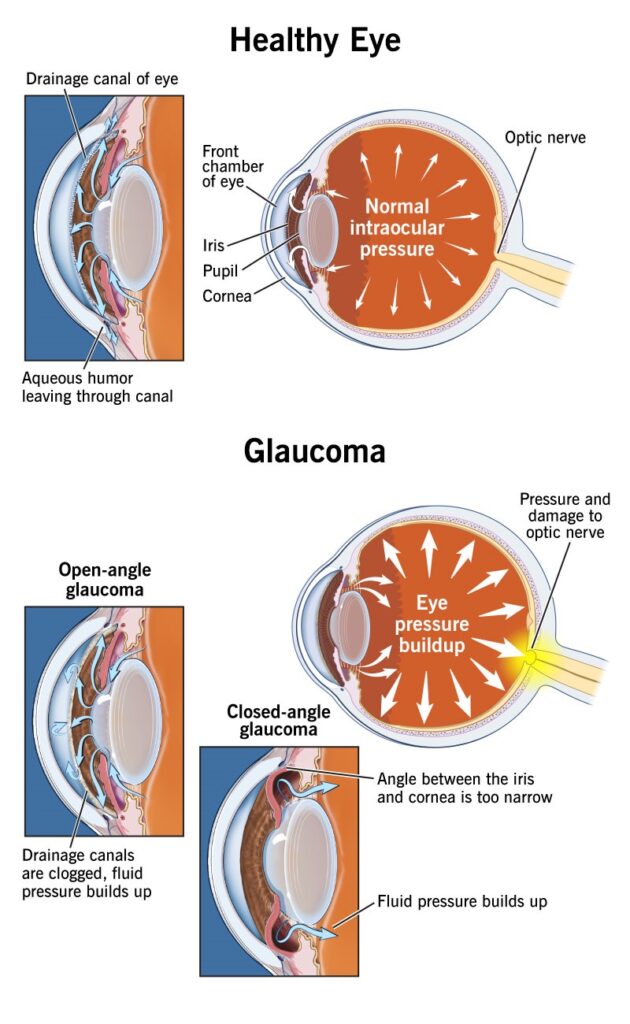Glaucoma
Glaucoma
Glaucoma is a group of diseases that lead to damage to the optic nerve, often associated with elevated eye pressure. This damage can result in vision loss and may be permanent if not treated. The optic nerve is essential for vision as it transmits images to the brain. Detecting glaucoma in its early stages is difficult because it typically does not cause pain or obvious symptoms until significant vision damage has occurred.
Types of Glaucoma
There are several types of glaucoma, the most notable being:
Open-angle glaucoma: The most common type, which develops slowly and is usually long-term.
Angle-closure glaucoma: More severe and can occur suddenly, requiring immediate medical care.
Secondary glaucoma: Results from another medical condition.
Congenital glaucoma: A rare condition that affects children from birth.

The causes of glaucoma vary and may include:
Increased intraocular pressure.
A family history of glaucoma.
Aging, especially after the age of 40.
Certain diseases, such as diabetes.
Long-term use of certain types of medication, like corticosteroids.
Glaucoma is diagnosed through eye exams that include:
Measuring eye pressure.
Examining the optic nerve, which may involve imaging.
Testing the field of vision.
Inspecting the angle of the eye.
Preventing Glaucoma
Avoiding glaucoma depends on several factors and may not always be possible, but risks can be reduced through:
Regular eye examinations, especially for those with risk factors.
Protecting the eyes from injuries.
Managing chronic diseases such as diabetes.
Regular physical exercise.

Treatment of Glaucoma
The treatment depends on the type and severity of glaucoma and includes:
Eye drops to reduce eye pressure.
Oral medications.
Surgery or laser treatment to improve fluid drainage from the eye.
Glaucoma Treatment with Eye Drops
Eye drops are the first step in treatment and aim to lower eye pressure. There are different types of drops, and you may need to try more than one type to control the condition.
Success Rate of Glaucoma Surgery
The success rate of surgery for treating glaucoma is relatively high, but it depends on several factors such as the type and severity of glaucoma. In some cases, patients may need more than one surgery.
After Glaucoma Surgery
After surgery, it is important to continue with regular check-ups and follow the doctor’s instructions regarding post-operative eye care, including the use of eye drops and avoiding activities that may exert pressure on the eye.
Tips After Glaucoma Surgery
Important tips include:
Avoid lifting heavy objects or bending over sharply.
Protect the eye from dust and water.
Avoid swimming and strenuous activities until approved by the doctor.
Adhere to medical appointments and use medications as prescribed.
Complications of Glaucoma Surgery
Possible complications include:
Infection.
Changes in eye pressure.
Vision problems such as blurriness.
In rare cases, loss of vision.
Working Hours
Saturday
7 pm to 9 pm
Sunday
7 pm to 9 pm
Monday
7 pm to 9 pm
Tuesday
7 pm to 9 pm
Wednesday
7 pm to 9 pm
Thursday
Closed
Friday
Closed
Ramadan Working Hours
Saturday to Wednesday from 9 pm to 11 pm
Location
21st Ismail Ramzy st. – El-Bostan – Heliopolis – 4th floor
01110114354
01222422637
Make Appointment
Always happy to receive your inquiries
